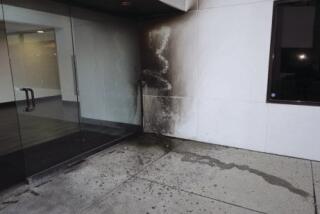Man Who Set Booby Trap Sentenced
A Newbury Park man was sentenced Wednesday to four consecutive life terms in prison for setting a booby trap in a methamphetamine lab at his home before a team of law enforcement agents arrived to investigate.
Bradley Raville, 46, made no statements in court and showed little emotion as Superior Court Judge Herbert Curtis III imposed the penalties during a brief hearing, a prosecutor said.
After the sentencing, Senior Deputy Dist. Atty. Chris Harman condemned Ravilleâs actions. âHe . . . not only tried to kill these guys, but tried to ruin their reputations by saying they tried to set him up,â Harman said.
A jury convicted Raville in August of three counts of attempted premeditated murder of a peace officer and one count each of attempted premeditated murder, operating a methamphetamine lab, possession of drugs for sale, gun possession and several enhancements, including committing those crimes while out on bail in another drug case.
Ravilleâs attorney argued that the three Ventura County sheriffâs deputies and an FBI agent who arrived at his clientâs house June 11, 1998, intended to plant the booby trap themselves.
Sheriffâs Det. Joe Evans, one of the officers, said the accusations against him and his colleagues were outrageous. Just as unsettling was the possibility that the men could have been killed.
âIâve been a peace officer for 20 years and Iâve never been on an incident where one person willingly tried to kill four police officers at one time,â Evans said Wednesday.
Evans and Sheriffâs Capt. Dennis Carpenter both told Curtis in court Wednesday they wanted Raville locked up for life.
Raville must serve at least 65 years in prison before he becomes eligible for parole, Harman said.
According to authorities, Raville and his girlfriend had an argument at her apartment, and a neighbor called police, who arrived after Raville left.
The girlfriend told deputies the couple had argued over drugs and Raville had an active lab inside a small workshop on his parentsâ back patio, unknown to the parents.
The girlfriend also warned deputies that Raville had gone home after another argument two weeks earlier and sat with a gun on his lap waiting for police to arrive, Harman said. But the police hadnât been called.
Four law enforcement officers arrived at Ravilleâs home after the June 11 argument to investigate the girlfriendâs allegations of a drug lab, Harman said. Evans and Carpenter were joined by Sheriffâs Det. Richard Barrios and FBI Special Agent Tom Powers.
On a desk in the lab, prosecutors said, were two cans of a flammable liquid. The cans were tied to a wire that was attached to the door, and underneath the cans was a lighted torch. The rig failed when the officers decided at the last second to enter the lab slowly rather than rush in, Harman said.
One can tipped slightly but failed to fall on the flame. The officers backed away after seeing the flame and called in bomb and hazardous materials experts and evacuated the neighborhood.
If the trap had worked, Harman said, it would have shot a fireball at the officers.
âThe only reason they didnât die was pure luck,â Harman said.
Ravilleâs attorney could not be reached for comment. Raville said nothing in court but admitted during trial that he had a drug problem, prosecutors said.
According to records, Raville had been in trouble with the law several times before this conviction. In fact, he was arrested in the fatal shooting of a tow-truck driver in 1996. He confessed to the killing, claiming self-defense, and was never charged.
More to Read
Sign up for Essential California
The most important California stories and recommendations in your inbox every morning.
You may occasionally receive promotional content from the Los Angeles Times.










